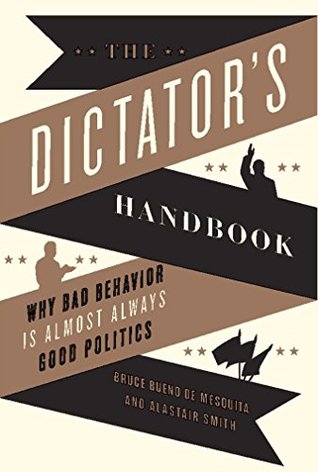More on this book
Community
Kindle Notes & Highlights
When addressing politics, we must accustom ourselves to thinking and speaking about the actions and interests of specific, named leaders rather than thinking and speaking about fuzzy ideas like the national interest, the common good, and the general welfare.
It should be obvious that any board members involved in deposing the former CEO have the potential to be a problem for a new CEO. Since they have already been coup makers, there is little reason to doubt that they stand ready to start trouble once again if they think the circumstances warrant it.
Rigged elections are a warning to powerful politicians that they are expendable if they deviate from the leader’s desired path.
Everybody in the Soviet selectorate could, with a very small probability, grow up to be general secretary of the Communist Party, just like the petty criminal Joseph Stalin and the uneducated Nikita Khrushchev. Those already in the inner circle knew they had to stay in line to keep their day jobs. Bravo, Lenin.
Although autocrats survive longer, they find surviving the initial period in office particularly difficult.
During their first six months they are nearly twice as likely to be deposed as their democratic counterparts. However, if they survive those first turbulent months, then they have a much better chance of staying in power than democrats.
First, taxes diminish how hard people work. Second, some of the tax burden inevitably will fall on the essential backers of the leader. (In general, the first constraint limits taxes in autocracies and the second constraint sets the boundary on taxes in democracies.)
Fearing exclusion and poverty under an alternative leadership, supporters are all the more fiercely loyal.
If you don’t like paying taxes—and who does—then you want to live in a democratic nation.
Taxing the poor to pay the rich has plenty of bad economic consequences, but these tend to be “in the long run”—that is, on another leader’s watch.
Autocrats can avoid the technical difficulties of gathering and redistributing wealth by authorizing their supporters to reward themselves directly.
In a phenomenon often called the resource curse, nations with readily extractable natural resources systematically underperform nations without such resources.19 Resource-rich nations have worse economic growth, are more prone to civil wars, and become more autocratic than their resource-poor counterparts.
Natural resources don’t require freedoms to be productive, and so they allow a leader to pay her coalition without the risk of empowering the people. A leader who can afford to keep the people isolated, uneducated, and ignorant and chooses not to do so is a fool.
Admittedly the minerals need to be extracted, but by and large autocrats can achieve this without the participation of the local population.
The oil companies run security firms, effectively small private armies, to keep the locals from obstructing the business or complaining about the environmental degradation that results.
resource curse enables autocrats to massively reward their supporters and accumulate enormous wealth.


